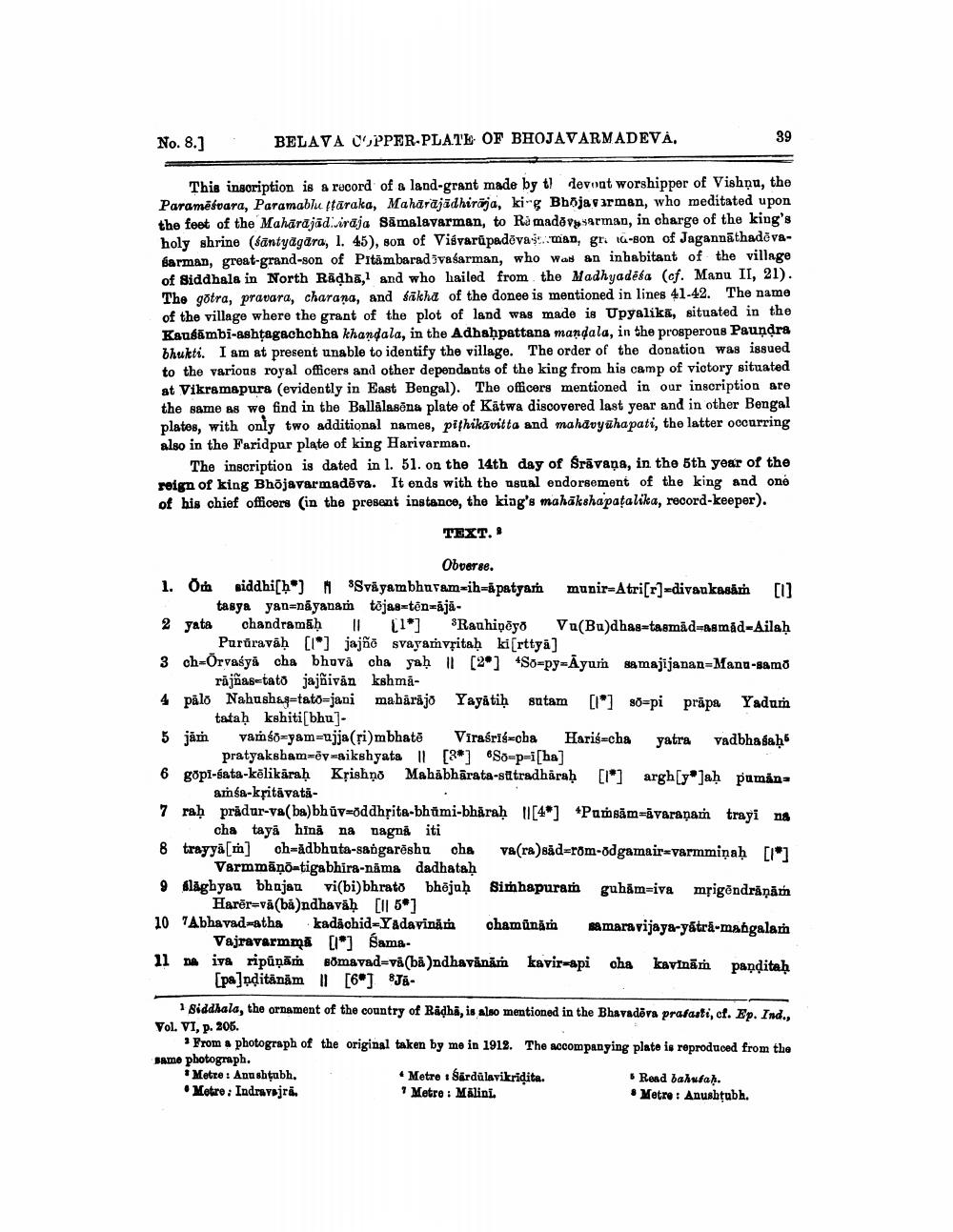________________
No. 8.]
BELAVA OOPPER-PLATE OF BHOJAVARMADEVA,
39
This inscription is a record of a land-grant made by ti devont worshipper of Vishnu, the Paramēsvara, Paramablu päraka, Maharajadhiräja, king Bhoja varman, who meditated upon the feet of the Mahārajādiraja Sāmalavarman, to Ramadov arman, in charge of the king's holy shrine (santyagara, 1. 45), son of Visvarūpadovas, man, gr. ta-son of Jagannāthadēvabarman, great-grand-son of Pitambaradjvasarman, who was an inhabitant of the village of Siddhala in North Rādha, and who hailed from the Madhyadeta (cf. Manu II, 21). The gotra, pravara, charana, and sākha of the donee is mentioned in lines 41-42. The name of the village where the grant of the plot of land was made is Upyalikx, situated in the Kausāmbi-ashtagachchha khandala, in the Adhahpattana mandala, in the prosperous Pauņdra bhukti. I am at present unable to identify the village. The order of the donation was issued to the various royal officers and other dependants of the king from his camp of victory situated at Vikramapura (evidently in East Bengal). The officers mentioned in our inscription are the same as we find in the Ballalasēna plate of Katwa discovered last year and in other Bengal plates, with only two additional names, pithikāvitta and mahāvyūhapati, the latter occurring also in the Faridpur plate of king Harivarman.
The inscription is dated in l. 51. on the 14th day of Srāvaņa, in the 5th year of the reign of king Bhõjavarmadēva. It ends with the usual endorsement of the king and one of his chief officers (in the present instance, the king's mahākshapatalika, record-keeper).
TEXT.
Obverse. 1. Om siddhi[h*) N 8Svayambhuvam=ih=āpatyam munir-Atri[r]=divankasa [1]
tasya yan=nāyanam tējas=tēn=ājā2 yata chandramāḥ 11 (10) Rauhipoyo Vu(Bu)dhag=tasmād=agmad-Ailah
Pururavāḥ [l*] jajño svayamvritaḥ ki[rttyä] 3 ch=Örvasya cha bhuva cha yaḥ 11 [2] So=py-Ayum sa majijanan=Mana-samo
räjñastato jajñivän kshma4 palo Nahusha =tato=jani mabärājo Yayatiḥ sutam [1*] sõ=pi prapa Yadum
tataḥ kshiti[bhu]. 5 jämn vaṁsoxyam=ujja(ri)mbhatë Viraßrig=cba Haris-cha yatra vadbhasah
pratyaksham=ēv=aikshyata 11 [3*] So=p=i[ha] 6 gopi-sata-kēlikāraḥ Krishņð Mahābhārata-sttradhāraḥ [18] argh[y]aḥ puman
amsa-kpitävata7 raḥ prădur-va(ba) bhūv=oddhỉita-bhimi-bhāraḥ 11[4*] *Pumsām=āvaraṇam traying
cha taya hina na nagni iti 8 trayyä[m] ch=ādbhuta-sangarëshu cha va(ra)sād=rom-odgamair=varmmiņaḥ [1]
Varmmāņoatigabhira-nama dadhataḥ 9 slaghyau bhajan vi(bi)bhrato bhõjuḥ Simhapuram guhäm=iva mpigēndrăņām
Harër=vä(båndhavaḥ [ll 5*] 10 TAbhavad-atha kadãohid-Yadavinăm chamūnám samaravijaya-yātrā-mangalam
Vajravarmma [l*] Sama. 11 na iva ripūņām Bðmavad=va(bā)ndhavinăm kavirapi cha kavinām paņditaḥ
[pa]pditānām ! [6] $JĀSiddhala, the ornament of the country of Radha, is also mentioned in the Bhavadēva prafasti, cf. Ep. Ind., VOL. VI, p. 206.
From a photograph of the original taken by me in 1912. The accompanying plate is reproduced from the same photograph. * Metre: Anushtabh. * Metre 1 Särdūlavikridita.
6 Read bahufan. • Metre : Indrayajra. 7 Metre : Målini.
• Metre: Anushtabh.




